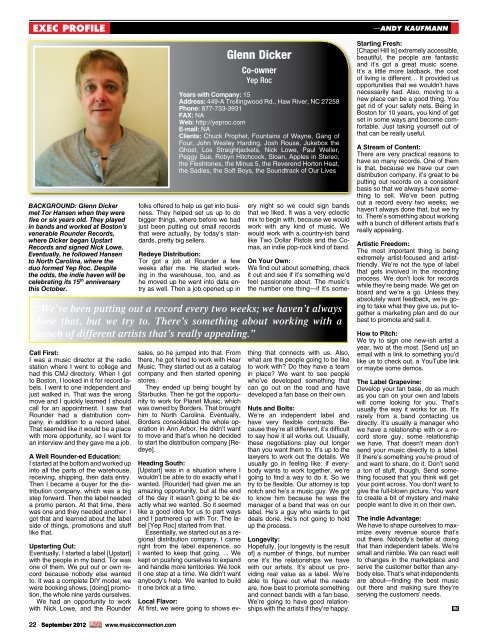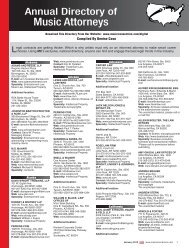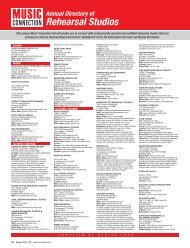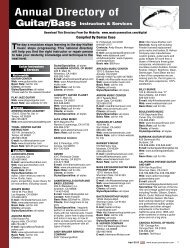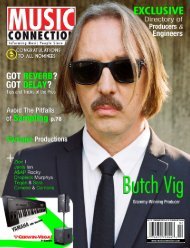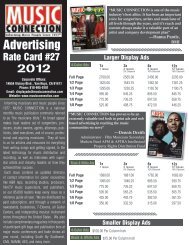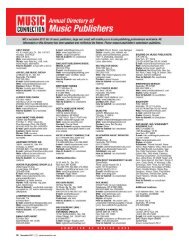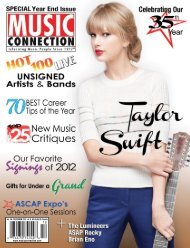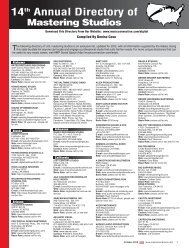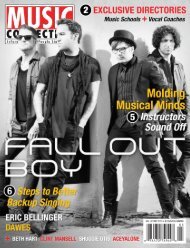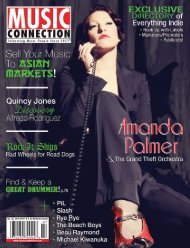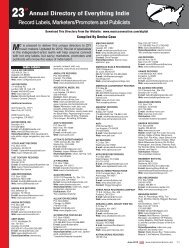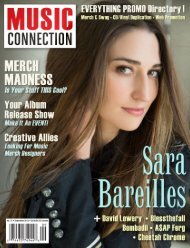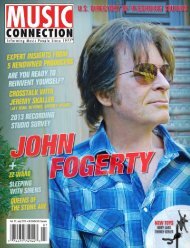TruSource Technology DL2 Integrated Digital Mixer
September 2012 - Music Connection
September 2012 - Music Connection
- No tags were found...
Create successful ePaper yourself
Turn your PDF publications into a flip-book with our unique Google optimized e-Paper software.
EXEC PROFILE<br />
BACKGROUND: Glenn Dicker<br />
met Tor Hansen when they were<br />
five or six years old. They played<br />
in bands and worked at Boston’s<br />
venerable Rounder Records,<br />
where Dicker began Upstart<br />
Records and signed Nick Lowe.<br />
Eventually, he followed Hansen<br />
to North Carolina, where the<br />
duo formed Yep Roc. Despite<br />
the odds, the indie haven will be<br />
celebrating its 15 th anniversary<br />
this October.<br />
Glenn Dicker<br />
Co-owner<br />
Yep Roc<br />
Years with Company: 15<br />
Address: 449-A Trollingwood Rd., Haw River, NC 27258<br />
Phone: 877-733-3931<br />
FAX: NA<br />
Web: http://yeproc.com<br />
E-mail: NA<br />
Clients: Chuck Prophet, Fountains of Wayne, Gang of<br />
Four, John Wesley Harding, Josh Rouse, Jukebox the<br />
Ghost, Los Straightjackets, Nick Lowe, Paul Weller,<br />
Peggy Sue, Robyn Hitchcock, Sloan, Apples in Stereo,<br />
the Fleshtones, the Minus 5, the Reverend Horton Heat,<br />
the Sadies, the Soft Boys, the Soundtrack of Our Lives<br />
“We’ve been putting out a record every two weeks; we haven’t always<br />
done that, but we try to. There’s something about working with a<br />
bunch of different artists that’s really appealing.”<br />
Call First:<br />
I was a music director at the radio<br />
station where I went to college and<br />
had this CMJ directory. When I got<br />
to Boston, I looked in it for record labels.<br />
I went to one independent and<br />
just walked in. That was the wrong<br />
move and I quickly learned I should<br />
call for an appointment. I saw that<br />
Rounder had a distribution company,<br />
in addition to a record label.<br />
That seemed like it would be a place<br />
with more opportunity, so I went for<br />
an interview and they gave me a job.<br />
A Well Rounder-ed Education:<br />
I started at the bottom and worked up<br />
into all the parts of the warehouse,<br />
receiving, shipping, then data entry.<br />
Then I became a buyer for the distribution<br />
company, which was a big<br />
step forward. Then the label needed<br />
a promo person. At that time, there<br />
was one and they needed another. I<br />
got that and learned about the label<br />
side of things, promotions and stuff<br />
like that.<br />
Upstarting Out:<br />
Eventually, I started a label [Upstart]<br />
with the people in my band. Tor was<br />
one of them. We put out or own record<br />
because nobody else wanted<br />
to. It was a complete DIY model; we<br />
were booking shows, [doing] promotion,<br />
the whole nine yards ourselves.<br />
We had an opportunity to work<br />
with Nick Lowe, and the Rounder<br />
folks offered to help us get into business.<br />
They helped set us up to do<br />
bigger things, where before we had<br />
just been putting out small records<br />
that were actually, by today’s standards,<br />
pretty big sellers.<br />
Redeye Distribution:<br />
Tor got a job at Rounder a few<br />
weeks after me. He started working<br />
in the warehouse, too, and as<br />
he moved up he went into data entry<br />
as well. Then a job opened up in<br />
sales, so he jumped into that. From<br />
there, he got hired to work with Hear<br />
Music. They started out as a catalog<br />
company and then started opening<br />
stores.<br />
They ended up being bought by<br />
Starbucks. Then he got the opportunity<br />
to work for Planet Music, which<br />
was owned by Borders. That brought<br />
him to North Carolina. Eventually,<br />
Borders consolidated the whole operation<br />
in Ann Arbor. He didn’t want<br />
to move and that’s when he decided<br />
to start the distribution company [Redeye].<br />
Heading South:<br />
[Upstart] was in a situation where I<br />
wouldn’t be able to do exactly what I<br />
wanted. [Rounder] had given me an<br />
amazing opportunity, but at the end<br />
of the day it wasn’t going to be exactly<br />
what we wanted. So it seemed<br />
like a good idea for us to part ways<br />
and I partnered up with Tor. The label<br />
[Yep Roc] started from that.<br />
Essentially, we started out as a regional<br />
distribution company. I came<br />
right from the label experience, so<br />
I wanted to keep that going. ... We<br />
kept on pushing ourselves to expand<br />
and handle more territories. We took<br />
it one step at a time. We didn’t want<br />
anybody’s help. We wanted to build<br />
it one brick at a time.<br />
Local Flavor:<br />
At first, we were going to shows every<br />
night so we could sign bands<br />
that we liked. It was a very eclectic<br />
mix to begin with, because we would<br />
work with any kind of music. We<br />
would work with a country-ish band<br />
like Two Dollar Pistols and the Comas,<br />
an indie pop-rock kind of band.<br />
On Your Own:<br />
We find out about something, check<br />
it out and see if it’s something we’d<br />
feel passionate about. The music’s<br />
the number one thing—if it’s something<br />
that connects with us. Also,<br />
what are the people going to be like<br />
to work with? Do they have a team<br />
in place? We want to see people<br />
who’ve developed something that<br />
can go out on the road and have<br />
developed a fan base on their own.<br />
Nuts and Bolts:<br />
We’re an independent label and<br />
have very flexible contracts. Because<br />
they’re all different, it’s difficult<br />
to say how it all works out. Usually,<br />
these negotiations play out longer<br />
than you want them to. It’s up to the<br />
lawyers to work out the details. We<br />
usually go in feeling like: if everybody<br />
wants to work together, we’re<br />
going to find a way to do it. So we<br />
try to be flexible. Our attorney is top<br />
notch and he’s a music guy. We got<br />
to know him because he was the<br />
manager of a band that was on our<br />
label. He’s a guy who wants to get<br />
deals done. He’s not going to hold<br />
up the process.<br />
Longevity:<br />
Hopefully, [our longevity is the result<br />
of] a number of things, but number<br />
one it’s the relationships we have<br />
with our artists. It’s about us providing<br />
real value as a label. We’re<br />
able to figure out what the needs<br />
are, how best to promote something<br />
and connect bands with a fan base.<br />
We’re going to have good relationships<br />
with the artists if they’re happy.<br />
—ANDY KAUFMANN<br />
Starting Fresh:<br />
[Chapel Hill is] extremely accessible,<br />
beautiful, the people are fantastic<br />
and it’s got a great music scene.<br />
It’s a little more laidback, the cost<br />
of living is different… It provided us<br />
opportunities that we wouldn’t have<br />
necessarily had. Also, moving to a<br />
new place can be a good thing. You<br />
get rid of your safety nets. Being in<br />
Boston for 10 years, you kind of get<br />
set in some ways and become comfortable.<br />
Just taking yourself out of<br />
that can be really useful.<br />
A Stream of Content:<br />
There are very practical reasons to<br />
have so many records. One of them<br />
is that, because we have our own<br />
distribution company, it’s great to be<br />
putting out records on a consistent<br />
basis so that we always have something<br />
to sell. We’ve been putting<br />
out a record every two weeks; we<br />
haven’t always done that, but we try<br />
to. There’s something about working<br />
with a bunch of different artists that’s<br />
really appealing.<br />
Artistic Freedom:<br />
The most important thing is being<br />
extremely artist-focused and artistfriendly.<br />
We’re not the type of label<br />
that gets involved in the recording<br />
process. We don’t look for records<br />
while they’re being made. We get on<br />
board and we’re a go. Unless they<br />
absolutely want feedback, we’re going<br />
to take what they give us, put together<br />
a marketing plan and do our<br />
best to promote and sell it.<br />
How to Pitch:<br />
We try to sign one new-ish artist a<br />
year, two at the most. [Send us] an<br />
email with a link to something you’d<br />
like us to check out, a YouTube link<br />
or maybe some demos.<br />
The Label Grapevine:<br />
Develop your fan base, do as much<br />
as you can on your own and labels<br />
will come looking for you. That’s<br />
usually the way it works for us. It’s<br />
rarely from a band contacting us<br />
directly. It’s usually a manager who<br />
we have a relationship with or a record<br />
store guy, some relationship<br />
we have. That doesn’t mean don’t<br />
send your music directly to a label.<br />
If there’s something you’re proud of<br />
and want to share, do it. Don’t send<br />
a ton of stuff, though. Send something<br />
focused that you think will get<br />
your point across. You don’t want to<br />
give the full-blown picture. You want<br />
to create a bit of mystery and make<br />
people want to dive in on their own.<br />
The Indie Advantage:<br />
We have to shape ourselves to maximize<br />
every revenue source that’s<br />
out there. Nobody’s better at doing<br />
that than independent labels. We’re<br />
small and nimble. We can react well<br />
to changes in the marketplace and<br />
serve the customer better than anybody<br />
else. That’s what independents<br />
are about—finding the best music<br />
out there and making sure they’re<br />
serving the customers’ needs.<br />
22 September 2012 www.musicconnection.com


